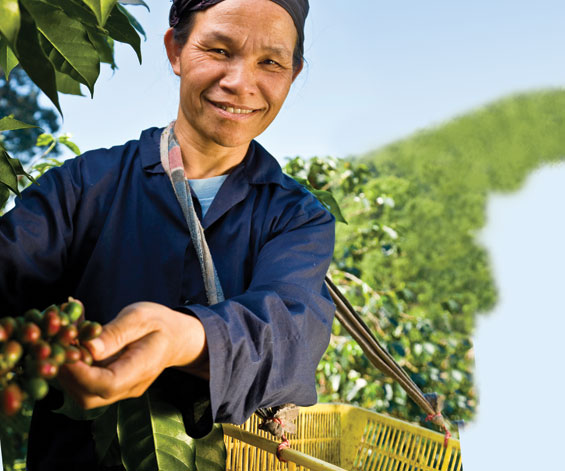
Although it was a foreign concept just a few years ago, fair trade business now occupies its own fair share of the market, particularly where coffee sales are concerned. It’s easy to see why this model is gaining in popularity over traditional commerce—there’s a never-ending list of great reasons to add fair-trade goods to your shopping list.
You’re right, the expression may sound a little strange. After all, aren’t the markets basically a free-for-all? Is there any room for ethics in such a system? It seems like a complete contradiction! Unless purchasing is driven by other reasons, of course…
Born in the U.S. in the 1940s, fair trade was originally associated with the Christian values of charity and fraternity. The desire for equitable conditions for farmers that enabled them to earn a living wage quickly caught on. Over the following decades, the movement spread around the world, outgrowing its religious roots and finally reaching Quebec in 1996. Today, fair trade is flourishing. For example, the sales of a major fair trade certification organization, FLO/TransFair, rose 67% in Canada and 22% globally between 2007 and 2008. So why are more and more people choosing fair trade products and businesses?
This message was the title to a book published by Laure Waridel, co-founder of Équiterre, in 2005, and addressed a truth that was gradually making its way into our collective conscience. Each of us exerts commercial, social, and environmental influences simply by choosing which goods to purchase. We can no longer deny that buying something can be a political gesture! Waridel’s book uses coffee as an example to illustrate the forces at play when goods are produced, distributed, and purchased, passing from producers to consumers and trickling down a long chain of intermediaries. It informs—or reminds—readers that Latin American food producers are often at the mercy of a series of buyers, each of whom puts pressure on the last to purchase goods at rock-bottom prices. It’s not hard to guess who the losers are in this situation.
One of the cornerstones of fair trade is keeping intermediaries to an absolute minimum. Buying fair trade means ensuring a large part of the price paid goes directly to the producer or cooperative to which the producer belongs (and is therefore part-owner). Each of these individual gestures adds up, and together they can have a considerable impact on the laws of the markets. For example, farmers belonging to fair trade networks are protected from the devastating effects of practices such as dumping, which keep produce prices artificially low.
One of the key characteristics of fair trade is that producers are assigned a minimum price for the goods they produce. This price accounts for both the “normal” price within traditional markets and actual production costs. It is therefore a kind of liberal commerce in the sense that price setting must account for the global commercial framework. However, it is based on ethical considerations too.
A premium is added to the minimum price and paid to the organization to which the producers must belong. This premium may be used to improve production methods—for example by purchasing more efficient equipment—or donated to the community to help build schools and healthcare facilities, or to purchase school supplies for children. Local organizations decide how to allot the funds based on member voting and regulations governing their participation in the fair trade network. These regulations address other matters in addition to the circulation of funds. Environmental standards and work conditions that protect workers’ health, laws against child labor, and the right to unionize all help to improve quality of life for Latin American producers, their families, and their communities.
Understanding the benefits of fair trade doesn’t mean being sure of the authenticity of products bearing related logos. In fact, unlike organic products, fair trade products are not subject to review or verification. Products and even businesses bearing the fair trade label may not actually adhere to any particular ethical standards. Fortunately, there are reliable, recognized fair trade labels that are worth seeking out if you wish to buy fair trade.
Fair trade commerce is divided into two major movements. One guarantees ethical business practices. For example, businesses like Ten Thousand Villages are WFTO-certified, meaning that both the business and the products it sells meet established fair trade standards. The second approach only certifies products through a logo displayed on the packaging. In this case, fair trade products can be sold from non-fair trade businesses—many supermarkets sell coffee in this manner. The two most common certifications of this type in Canada are FLO/TransFair and Ecocert, and still others exist too. To help consumers with their purchasing decisions, Équiterre has put together a guide full of information on fair trade certification and the principles guiding certification. It’s easy to read and highly informative. You can get your own copy for free online.
Quebec is home to hundreds of businesses that sell fair trade products or that are fair trade–certified, so there’s a good chance you’ll be able to find something to suit your tastes close to home. For more information, check out the list of fair trade vendors posted on the Équiterre website, which also lets you search by product and region. And because the tool is updated regularly, you can even let us know about any products or retailers that aren’t yet listed! You’ll also find information on the types of products available in Quebec. In addition to standbys such as coffee, chocolate, bananas and rice, you’ll find items like arts and crafts, flowers, sports balls, cosmetics—and the list grows on and on!
The future of North American–Latin American relations depends on changes in behavior, particularly where Northern citizens are concerned. The growing popularity of fair trade goods is encouraging, and fans of fair trade prove every day that commerce and justice are in fact a perfect match!